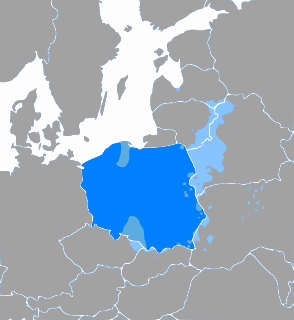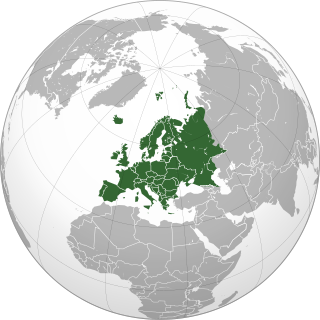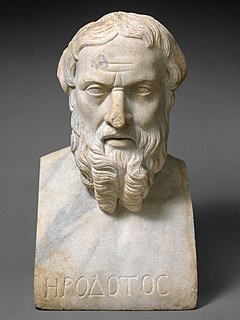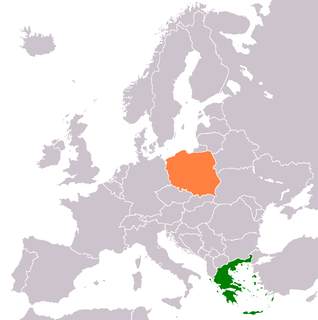
Historiography is the study of the methods of historians in developing history as an academic discipline, and by extension is any body of historical work on a particular subject. The historiography of a specific topic covers how historians have studied that topic using particular sources, techniques, and theoretical approaches. Scholars discuss historiography by topic—such as the historiography of the United Kingdom, that of WWII, the British Empire, early Islam, and China—and different approaches and genres, such as political history and social history. Beginning in the nineteenth century, with the development of academic history, there developed a body of historiographic literature. The extent to which historians are influenced by their own groups and loyalties—such as to their nation state—remains a debated question.

Poland, officially the Republic of Poland, is a country in Central Europe. It is divided into 16 administrative provinces called voivodeships, covering an area of 312,696 km2 (120,733 sq mi). Poland has a population of over 38 million and is the fifth-most populous member state of the European Union. Warsaw is the nation's capital and largest metropolis. Other major cities include Kraków, Łódź, Wrocław, Poznań, Gdańsk, and Szczecin.

Polish is a West Slavic language of the Lechitic group, written in the Latin script. It is spoken primarily in Poland and serves as the native language of the Poles. In addition to being the official language of Poland, it is also used by Polish minorities in other countries. There are over 50 million Polish speakers around the world – it is the sixth-most-spoken language of the European Union. Polish is subdivided into regional dialects and maintains strict T–V distinction pronouns, honorifics and various forms of formalities when addressing individuals.

The szlachta were the noble estate of the realm in the Kingdom of Poland, the Grand Duchy of Lithuania, and the Polish–Lithuanian Commonwealth who, as a class, had the dominating position in the state, exercising extensive political rights and power. Szlachta as a class differed significantly from the feudal nobility of Western Europe. The estate was officially abolished in 1921 by the March Constitution.

Semites, Semitic peoples or Semitic cultures was a term for an ethnic, cultural or racial group. The terminology is now largely obsolete outside the grouping "Semitic languages" in linguistics.
Voivode is a title denoting a military leader or warlord in Central, Southeastern and Eastern Europe since the Early Middle Ages. It primarily referred to the medieval rulers of the Romanian-inhabited states and of governors and military commanders of Hungarian, Balkan or some Slavic-speaking populations.

An antiquarian or antiquary is an aficionado or student of antiquities or things of the past. More specifically, the term is used for those who study history with particular attention to ancient artifacts, archaeological and historic sites, or historic archives and manuscripts. The essence of antiquarianism is a focus on the empirical evidence of the past, and is perhaps best encapsulated in the motto adopted by the 18th-century antiquary Sir Richard Colt Hoare, "We speak from facts, not theory."
The intelligentsia is a status class composed of the university-educated people of a society who engage in the complex mental labours by which they critique, shape, and lead in the politics, policies, and culture of their society; as such, the intelligentsia consists of scholars, academics, teachers, journalists, and literary writers.

Wawrzyniec Goślicki was a Polish nobleman, Bishop of Poznań (1601–1607), political thinker and philosopher best known for his book De optimo senatore (1568).
Cultural history combines the approaches of anthropology and history to examine popular cultural traditions and cultural interpretations of historical experience. It examines the records and narrative descriptions of past matter, encompassing the continuum of events about a culture.

The Polish Academy of Arts and Sciences or Polish Academy of Learning, headquartered in Kraków and founded in 1872, is one of two institutions in contemporary Poland having the nature of an academy of sciences.
The culture of Poland is the product of its geography and distinct historical evolution, which is closely connected to an intricate thousand-year history. Polish culture forms an important part of western civilization and the western world, with significant contributions to art, music, philosophy, mathematics, science, politics and literature.
The following outline is provided as an overview of and topical guide to history:

The history of the Jews in Europe spans a period of over two thousand years. Some Jews, a Judaean tribe from the Levant, migrated to Europe just before the rise of the Roman Empire. A notable early event in the history of the Jews in the Roman Empire was Pompey's conquest of Judea beginning in 63 BCE, although Alexandrian Jews had migrated to Rome before this event.

History is the study and the documentation of the past. Events before the invention of writing systems are considered prehistory. "History" is an umbrella term comprising past events as well as the memory, discovery, collection, organization, presentation, and interpretation of these events. Historians seek knowledge of the past using historical sources such as written documents, oral accounts, art and material artifacts, and ecological markers.

Greek-Polish relations are relations between Greece and Poland. Both countries are full members of the European Union, OECD, Organization for Security and Co-operation in Europe and NATO. There are circa 4,000 people of Greek descent living in Poland, and over 20,000 people of Polish descent living in Greece.
Politics of memory is the organisation of collective memory by political agents; the political means by which events are remembered and recorded, or discarded. Eventually, politics of memory may determine the way history is written and passed on, hence the terms history politics or politics of history. The politics of history is the effects of political influence on the representation or study of historical topics, commonly associated with the totalitarian state which use propaganda and other means to impose a specific version of history with the goal of eliminating competing perspectives about the past. Nevertheless, the term is contested and there is no common agreement on its meaning which is often a matter of contextual use.
This glossary of history is a list of definitions of terms and concepts relevant to the study of history and its related fields and sub-disciplines, including both prehistory and the period of human history.
Slavery in Poland existed on the territory of the Kingdom of Poland during the rule of the Piast dynasty in the Middle Ages. It continued to exist in various forms until late in the 14th century when it was supplanted by the institution of serfdom, which has often been considered a form of modified slavery.

Greater Poland, often known by its Polish name Wielkopolska, is a historical region of west-central Poland. Its chief and largest city is Poznań followed by Kalisz, the oldest city in Poland.













